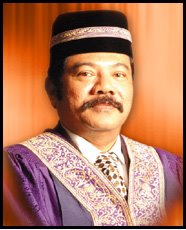Of the many ministers in Pak Lah bloated cabinet, he has shown himself to be pretty much the most responsive to constructive criticism. Even our Parliamentary Opposition Leader, Sdr Lim Kit Siang has more than once, in recent months, taken his hats off to Tok Pa. In the short 5 months since Tok Pa became the Minister of Higher Education, he was commended by Sdr Lim when he made instant clarification to a blog statement by the latter. I've also blogged about it here.
Tok Pa quickly followed up with the statement with the release of the much awaited Zahid Higher Education Report, firstly in physical form and not long after that, a truncated version published on the Ministry website in PDF format. However, the last I checked, the full report is now available in PDF format in both English and Bahasa Malaysia on the website.
Most recently, Tok Pa was again commended for immediately requesting from Sdr Lim, the details of a top STPM student who was for some reason denied a place in the local public universities (read also my post on University Entrance: Something's Not Right...). While the outcome of the enquiry is still unknown, it certainly showed that Tok Pa (and his team) is definitely on the ball. Our local press of course, happily highlighted the case. You probably can't say that about most of our ministers.
What I was pleased to read in the Star recently, was also his personal interest in improving the education, and in particular, the standards of English language amongst rural folks in his constituency in Jeli. Not only does he spend his allowance as an MP on a tuition centre, together with his wife, they do some part time "teachings" over the weekends personally.
It was his concern for the pupils' lack of English proficiency in the 27 schools around Jeli, Kelantan, that led Higher Education Minister Datuk Mustapa Mohamed to set up a tuition centre 10 years ago.While the skeptics among us will say the entire set up is a public relations exercise for a politician, I would argue that at the very least, the exercise has been executed well and has benefited thousands. That's much more than many others who could well have spent their MP's allowance on karaoke sessions to entertain their cronies and business associates. Or for that matter, those who take part in a PR exercise for a supposed grassroot event which never takes off beyond the launch day.
The tuition centre known as Darul Falah or House of Success, and located within the minister's residence originally catered to pupils in Year Six.
“In the first eight years, we helped pupils to prepare for their UPSR because we found they were doing quite well in most subjects except for English... But what the teacher found was that their foundation was so weak in English that it was better to accept them from the time they were in Year Five so there was more time to work on improving their grasp of the language,” says Mustapa...
The classes which are provided free of charge, are held on Friday and Saturday (the Kelantan weekend) in two sessions, morning and afternoon and pupils are provided with breakfast, lunch and tea.
Hence, of the lot we have acting as our country's leaders, I'm glad to have Tok Pa as the Minister of Higher Education, even more so now than I was when he was appointed. While there's really plenty that needs to be done to our Higher Education system, and plenty of criticisms which we can all make here, at least we know that we have a Minister who is willing to put in at least a bit of effort to make things better.
Tok Pa, we are all hoping for better things to come! :)


